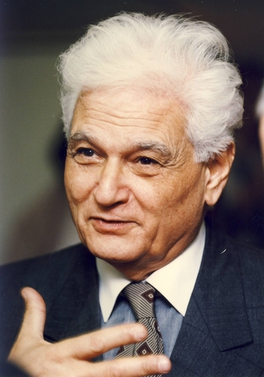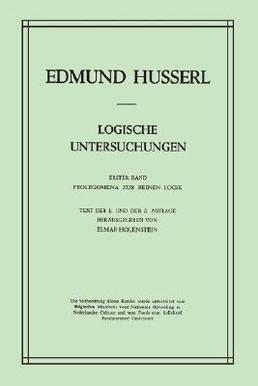
Edmund Gustav Albrecht Husserl was an Austrian-German philosopher and mathematician who established the school of phenomenology.

Martin Heidegger was a German philosopher who is best known for contributions to phenomenology, hermeneutics, and existentialism. He is often considered to be among the most important and influential philosophers of the 20th century.

Jacques Derrida was a French philosopher. He developed the philosophy of deconstruction, which he utilized in a number of his texts, and which was developed through close readings of the linguistics of Ferdinand de Saussure and Husserlian and Heideggerian phenomenology. He is one of the major figures associated with post-structuralism and postmodern philosophy although he distanced himself from post-structuralism and disowned the word "postmodernity".

Hermeneutics is the theory and methodology of interpretation, especially the interpretation of biblical texts, wisdom literature, and philosophical texts. As necessary, hermeneutics may include the art of understanding and communication.

Phenomenology is the philosophical study of objectivity and reality as subjectively lived and experienced. It seeks to investigate the universal features of consciousness while avoiding assumptions about the external world, aiming to describe phenomena as they appear to the subject, and to explore the meaning and significance of the lived experiences.

Jean Baudrillard was a French sociologist, philosopher and poet, with interest in cultural studies. He is best known for his analyses of media, contemporary culture, and technological communication, as well as his formulation of concepts such as hyperreality. Baudrillard wrote about diverse subjects, including consumerism, critique of economy, social history, aesthetics, Western foreign policy, and popular culture. Among his most well-known works are Seduction (1978), Simulacra and Simulation (1981), America (1986), and The Gulf War Did Not Take Place (1991). His work is frequently associated with postmodernism and specifically post-structuralism. Nevertheless, Baudrillard had also opposed post-structuralism, and had distanced himself from postmodernism.
Continental philosophy is typically a term used as an umbrella term for philosophies prominent in continental Europe. Michael E. Rosen has ventured to identify common themes that typically characterize continental philosophy. These themes proposed by Rosen derive from a broadly Kantian thesis that knowledge, experience, and reality are bound and shaped by conditions best understood through philosophical reflection rather than exclusively empirical inquiry.

Being and Time is the 1927 magnum opus of German philosopher Martin Heidegger and a key document of existentialism. Being and Time is among the most influential texts of 20th century philosophy. It had a notable impact on subsequent philosophy, literary theory and many other fields. Though controversial, its stature in intellectual history has been compared with works by Kant and Hegel. The book attempts to revive ontology through an analysis of Dasein, or "being-in-the-world." It is also noted for an array of neologisms and complex language, as well as an extended treatment of "authenticity" as a means to grasp and confront the unique and finite possibilities of the individual.
Modern philosophy is philosophy developed in the modern era and associated with modernity. It is not a specific doctrine or school, although there are certain assumptions common to much of it, which helps to distinguish it from earlier philosophy.
Existential phenomenology encompasses a wide range of thinkers who take up the view that philosophy must begin from experience like phenomenology, but argues for the temporality of personal existence as the framework for analysis of the human condition.
The phenomenology of religion concerns the experiential aspect of religion, describing religious phenomena in terms consistent with the orientation of worshippers. It views religion as made up of different components, and studies these components across religious traditions in order to gain some understanding of them.

Jean-Luc Marion is a French philosopher and Catholic theologian. He is a former student of Jacques Derrida whose work is informed by patristic and mystical theology, phenomenology, and modern philosophy.
French philosophy, here taken to mean philosophy in the French language, has been extremely diverse and has influenced Western philosophy as a whole for centuries, from the medieval scholasticism of Peter Abelard, through the founding of modern philosophy by René Descartes, to 20th century philosophy of science, existentialism, phenomenology, structuralism, and postmodernism.
Phenomenology or phenomenological psychology, a sub-discipline of psychology, is the scientific study of subjective experiences. It is an approach to psychological subject matter that attempts to explain experiences from the point of view of the subject via the analysis of their written or spoken words. The approach has its roots in the phenomenological philosophical work of Edmund Husserl.
In Being and Time, the philosopher Martin Heidegger makes the distinction between ontical and ontological, or between beings and being as such. He labeled this the "ontological difference." It is from this distinction that he develops the concept of "fundamental ontology."
Dermot Moran is an Irish philosopher specialising in phenomenology and in medieval philosophy, and he is also active in the dialogue between analytic and continental philosophy. He is currently the inaugural holder of the Joseph Chair in Catholic Philosophy at Boston College. He is a member of the Royal Irish Academy and a founding editor of the International Journal of Philosophical Studies.
Jean Grondin is a Canadian philosopher and professor. He is a specialist in the thought of Immanuel Kant, Hans-Georg Gadamer, and Martin Heidegger. His research focuses on hermeneutics, phenomenology, German classical philosophy and the history of metaphysics.

The Logical Investigations is a two-volume work by the philosopher Edmund Husserl, in which the author discusses the philosophy of logic and criticizes psychologism, the view that logic is based on psychology.
Buddhist thought and Western philosophy include several parallels.
Early phenomenology refers to the early phase of the phenomenological movement, from the 1890s until the Second World War. The figures associated with the early phenomenology are Edmund Husserl and his followers and students, particularly the members of the Göttingen and Munich Circles, as well as a number of other students of Carl Stumpf and Theodor Lipps, and excludes the later existential phenomenology inspired by Martin Heidegger. Early phenomenology can be divided into two theoretical camps: realist phenomenology, and transcendental or constitutive phenomenology.







